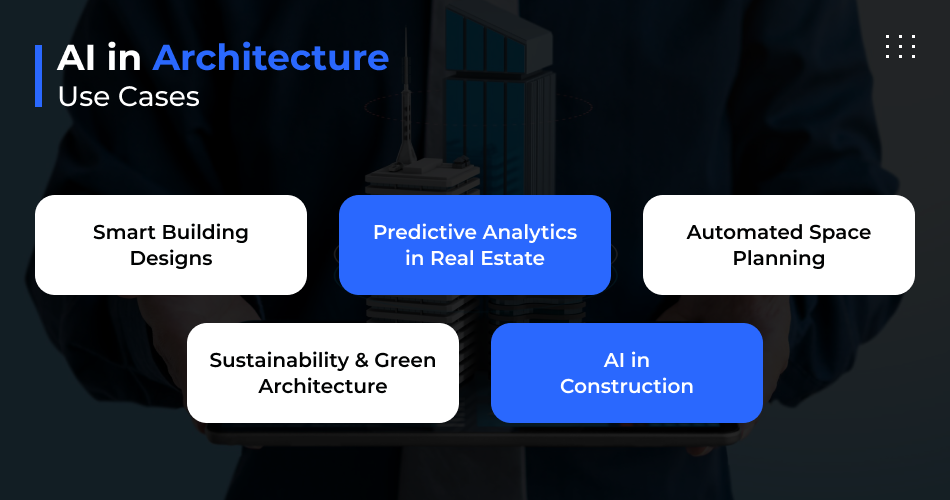How AI for Architectural Design is Revolutionizing Real Estate
Artificial Intelligence (AI) is already disrupting and re-shaping how we create infrastructure for the world. In fact, AI is no longer a luxury but rather a necessity for any architect or engineer in the architecture, engineering and construction industry.
Thus, 86% of respondents are convinced that AI for architectural design has great potential in the context of the architecture industry’s future, 74% of which reported that they are going to expand their usage of this tool in the next year. RIBA president Muyiwa noted this with the statement, “AI is the most disruptive tool of our time, and we can’t overemphasize its importance on the future of architectural practice.”
While the use of AI alters how buildings are constructed, and even influences real estate development to provide more efficient and sustainable solutions. The increasing incorporation of AI techniques in architectural practices is changing the face of real estate AI software development company efforts are improving the quality of built environments and facilitating intelligent choices design and planning.
Let’s delve into the world of how AI is shaping architecture now.
Understanding the Role of AI in Architecture

AI for architectural design has progressed from being a conceptual notion in architecture to a substantial factor for change in the sphere. There are new computational processes, generative design, and parametric modeling as well as construction planning tasks that AI assists architects with.
There is, for example, generative design that enables a generative AI development company like Biz4Group to generate numerous designs, based on provided constraints such as sustainability, use of materials, and cost. What makes AI especially relevant is the fact that it can process large sets of data in a matter of minutes, something a human would take hours to accomplish.

Source – Chaos Enscape
The use of AI technologies in this case helps the architects to know how that design will behave in a certain condition. This predictive power is useful in foreseeing areas of concern at the planning phase, to limit disastrous design mistakes at a later stage.
According to RIBA president Muyiwa Oki, AI is not only revolutionizing the design process but also the ways in which we engage with our cities and built worlds. From this perspective, it is easy to appreciate that AI has become a core part of architectural practice, and the more firms adopt such technologies, the likely prospect of smarter designs emerging in the future.
AI in Architecture Use Cases

AI for architectural design uses extend beyond simply augmenting the visually appealing aesthetics of a space. By leveraging AI consulting services, architects can optimize structural design and improve energy efficiency:
1. Smart Building Designs:
AI plays a critical role in the creation of smart building systems that can operate and adapt to the surrounding conditions independently. Weather management, lighting, temperature, energy consumption and overall comfort, every aspect of a building is taken care of by AI.
For instance, many modern structures such as “The Edge” in Amsterdam employs AI to decrease its energy consumption level by 70%. These features are important as sustainability emerges as a fundamental principle of contemporary architecture.
2. Predictive Analytics in Real Estate:
Using data mining, architects are able to identify the trends in the given markets and anticipate the future worth of properties. Models that forecast market demand guarantee that buildings can be adjusted to fit the market, and as a result are more valuable and useful in the long run.
3. Automated Space Planning:
The applications of AI for architectural design are seen in two programs: Spacemaker and Autodesk, that assist architects with space planning. Such devices provide several design possibilities within several minutes, and consider the parameters as light, air movement, and noise. This accelerates the design cycle and helps architects to pay more attention to design aspects.
4. Sustainability & Green Architecture:
Several AI-optimized buildings are currently on the market, and many of them have cut carbon emissions by as much as 50%.
5. AI in Construction:
Construction technologies apply robotics and drones to continuously track final work and timely completion of projects within the targeted budgets. These systems increase commodity safety within construction areas, as well as supply details that propel effectiveness.
AI & Smart Real Estate
AI integration services are not only changing the landscape of architecture, but also have a significant role to play in the real estate business, especially in property management and customer satisfaction:
1. AI for Intelligent Property Management

AI systems are also emerging in key areas of property management such as energy control, predictive maintenance, and tenant interaction. Through integration of AI to construct AI buildings, the way maintenance services are delivered is changed, touching on prediction of when maintenance is required before the occurrence of a problem that can cause downtime, and consequently affect the building’s duration.
According to the Chaos and Architizer report, over two-thirds of the participants have been using or intending to use AI tools and services, but 60% of them have not undergone any formal AI training; instead, they continue to learn as they apply the technology in their work.
2. Enhancing the Real Estate Customer Experience:

New methods of client engagement are becoming increasingly popular, thanks to AI for property management: virtual tours and individual recommendations of properties. This has enabled buyers to tour a given property through virtual reality, view the possibilities of layout or complete layout options, and even observe property pricing in real-time, thus increasing the efficiency and interactivity of the buying process.
Hence, this improved customer interaction leads to improved decision making and increased client contentment.
Future Trends of AI in Architecture & Real Estate

AI for architectural design will only continue to progress in the future with more developments in the pipeline. In terms of sustainability, AI comes in handy in providing architects with options for more environmentally friendly products and resources, methods of conserving energy, and green approaches in construction.
AI identifies the durability of construction materials, and increases the life spans of structures and assists in meeting the sustainability objectives of construction.

Source – Chaos Enscape
Preparing graduates for the future, the need for formal training in the application of AI will indeed increase as the industry adapts the technology. 18% of the respondents admitted that they would seek formal training in artificial intelligence, which shows understanding of the fact that to get the maximum benefit of applying AI, one needs specialized knowledge.
This trend potentially points to making AI an inherent part of architectural work with uses beyond the design of buildings, projects, city and even city Intelligence.
How Biz4Group Can Be the Right Choice to Develop AI Solution for Architecture Design?
Today, Architecture and Real Estate industries are experiencing the changes brought by AI real estate solutions for their development, and to bring the right partner for such developments is of great importance.
For decades, Biz4Group has been providing its clients with cutting-edge technology solutions that are powered by artificial intelligence. Our team of professional developers and architects will be able to discuss the application of our AI products with your individual project requirements, the utilization of AI in designing automation, effective usage of smart buildings or perfecting project management.
At Biz4Group, we consider advanced AI tools for architecture which can change the approaches to design. From generative design to real-time 3D visualization, our AI solutions help you to complete projects faster with better accuracy and environmental impact. We are familiar with the requirements of architecture and deliver AI solutions that meet specific requirements of architecture.
To have a better understanding of our achievements in real estate projects, check out the Portfolio for Facilitor.

As a trusted consultant with experience in AI service implementation and satisfaction guarantee, Biz4Group is your ideal choice for designing an innovative AI solution for your architectural design needs.
Contact us today, and let us assist you in integrating real estate app ideas and trending AI systems into your business since they are developed to fit your company for the next big shift. To know more about how Biz4Group can transform your architectural projects, visit Biz4Group.
 info@biz4group.com
info@biz4group.com 





















































